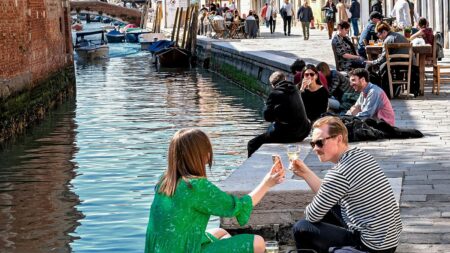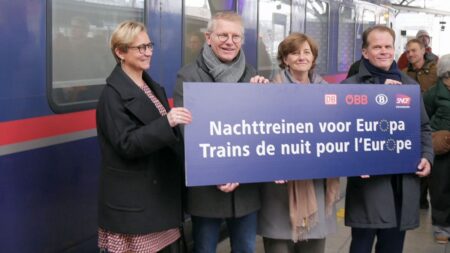One pilot says she finds it detrimental to progress when female passengers give her over-enthusiastic praise because she is a woman.
When Ruth Smith goes to work, she is one of just 5 per cent, give or take, of global employees in her role who are women.
Smith is a pilot with British Airways (BA) and flies commercial Boeing 777 planes.
While women are heavily involved in the aviation industry in jobs like cabin crew and air traffic control, they have historically been sidelined when it comes to flying or fixing planes.
This is despite the fact that these jobs are some of the few in the world without a gender pay gap.
For International Women’s Day, Euronews Travel talked to three pilots and an engineer about what it’s like to buck the trend.
‘I was told there weren’t any female pilots’
Smith’s inspiration to become a pilot began with her dad, a captain with BA. “Since a very young age I was privileged to be able to go away on work trips with him,” she says.
Knowing him and his female colleagues inspired both Smith and her sister to follow a similar career path.
But entrenched gender conventions proved an almost immediate stumbling block.
“One of the biggest obstacles I had to overcome was dealing with stereotyping from career advisors,” she recalls. “I was even told there weren’t any female pilots!”
Smith believes flying planes is still a male-dominated job because it is not highlighted as a career option early on for women.
“It’s a career where you have to show interest, aptitude and skills that put you above the rest when applying for sponsorships,” she says. Some airlines have sponsorships programmes where they cover some or all of a cadet’s training fees.
“If you don’t believe you can do it, you might not have targeted your CV to make you stand out and it’s tough competition out there.”
She also thinks many people wrongly believe it’s not a career you can manage with a family.
“I have a whole community of British Airways colleagues who have proved this to be incorrect,” she says.
‘It is different connecting with like-minded women in the industry’
Like Smith, Katherine Moloney found the early stages of her career a challenge. She began by training for a private pilot helicopter license in 2018 and then a fixed wing license in 2022.
“During my training, I did not have contact with any female instructors, or other female student pilots,” she says.
“This is not to detract from the great male instructors I had, but it is different connecting with like-minded women in the industry.”
This feeling of isolation spurred Moloney to launch Elevate(her), an online resource platform and community dedicated to supporting, connecting and informing women in aviation globally.
“Great moves have been made towards recognising we need more diversity and inclusion within the industry,” she says. “However, it is important to recognise there are still huge issues with the recruitment and retention of females in aviation roles.”
Elevate(her) uses social media to “engage with the next generation and show them all the amazing women breaking barriers in aviation today and forging a path forward.”
The platform has had over 4.8 million social media views since its launch in May 2023 and connected thousands of women worldwide.
Still a long way to go for gender parity in the aviation industry
The aviation industry as a whole has been “traditionally more angled towards men in terms of accessibility, aircraft design, lack of female facilities at some airports etc.” says Moloney.
But she says that aviation companies and stakeholders are now recognising these barriers and working to change them.
“We are proud to have a higher proportion of female pilots than other major airlines, but we, and the aviation industry as a whole, have a long way to go,” a spokesperson from BA told Euronews.
Training programmes give aspiring female pilots someone to identify with
Smith is now a Training Captain on Boeing 777 aircraft and praises BA’s training programmes for their inclusivity.
“At British Airways you succeed based on merit regardless of how you look or how you identify,” she says.
“We invest in a huge amount of community engagement work because we need to educate and show people from an early age this fantastic career and help them to achieve their dreams.”
The airline has been has had a flight simulator for more than 25 years and travels around the country to schools, youth organisations, recruitment fairs and air shows to give young people the experience of flying with a BA pilot.
“Most importantly, it gives people access to chat to current pilots, allowing people to see and talk to someone that looks like them or that they can identify with,” Smith says.
Hungarian-owned Wizz Air has launched a “She Can Fly Program” for female cadets which supports women wanting to become pilots. The scheme has a low tuition fee of €800 – an important advantage in a career path which many find too expensive to pursue.
‘Don’t let imposter syndrome hold you back’
Smith’s most important piece of advice is not to let imposter syndrome hold you back.
Wizz Air Captain Jemma Fisk similarly feels that emphasis on gender is detrimental in the workplace.
“In my experience, it makes no difference regarding gender on your ability to do the job well, gain acceptance from colleagues and pursue a successful career,” she says.
In fact, she doesn’t mind too much when people assume she is cabin crew rather than a pilot. “The difficult scenarios for me are when female passengers, entering or leaving the aircraft, feel it necessary to broadcast their over-enthusiastic praise for a female pilot,” she says.
‘I see myself as an engineer who happens to be a woman’
Like Smith and Moloney, aircraft engineer Tsungi Maruta says visibility is key to bringing more women into the aviation industry.
“I didn’t see anyone that looked like me doing my job and I think having visible role models helps in ensuring that the focus is maintained,” she says.
“I also think sharing more behind the scenes insights to really capture how broad engineering is will help.”
For example, one of Maruta’s main tools is a regular iPad, which gives access to a host of manuals, technical logs and tasks.
Maruta began working as an aircraft mechanic for BA 10 years ago and has witnessed an increase in the percentage of female engineers.
“Last year for International Women in Engineering Day, I had the great pleasure of departing a flight with an all-female engineering team,” she says.
Maruta says that going into what is perceived as a male-dominated environment can appear daunting, but it was a positive experience for her.
“I see myself as an engineer who happens to be a woman,” she says. “I think that some of the challenges arise from perceptions and stereotypes, and I think it’s crucial to own your success and believe in your capability.”
Read the full article here











